Blogs
Step-by-Step Guide on How to Renew or Buy Insurance Online with New India Assurance
In today's fast-paced world, convenience is key. So why not when it comes to insurance? Whether you need to buy a new policy or renew an existing one, The New India Assurance Co. Ltd. offers a seamless digital experience.
Save your time, reduce paperwork, and get access to a wide range of general insurance products on newindia.co.in
Why Choose New India Assurance for Online Insurance?
- Founded in 1919, one of India’s largest public sector general insurance companies
- Strong global footprint and high claim settlement ratio
- Robust digital portal for quick and transparent services
You can easily use our digital portals to:
- Health insurance policies and renewals
- Motor (car and two-wheeler) insurance
- Home insurance
- Personal accident cover
- Travel and overseas insurance
How to Buy Insurance Online with New India Assurance?
- Step 1: Go to https://newindia.co.in
- Step 2: Browse Insurance Categories under “All Products”
- Step 3: Choose Your Policy
- Step 4: Get a Quote by entering basic details
- Step 5: Make Payment via net banking, UPI, or card
- Step 6: Download Policy Document instantly
How to Renew Insurance Online with NIA
- Direct Renewal Portal: https://www.newindia.co.in/portal/quickRenewPost/renewal
- Step 1: Visit the Renewal Page
- Step 2: Enter Policy Details
- Step 3: Review & Update Details (If Needed)
- Step 4: Make the Payment
- Step 5: Instant Renewal Confirmation
Benefits of Buying or Renewing Insurance Online with New India Assurance
- 24/7 access to policy services
- No agent dependency or paperwork
- Secure online payments
- Faster turnaround with instant e-policy
- Policy tracking & updates via email/SMS
- Access to add-on covers and customisation options
Popular Policies You Can Buy or Renew Online
| Insurance Type | Key Features |
| Motor Insurance | Instant premium quotes, NCB retention, add-on covers like zero depreciation |
| Health Insurance | Individual, family floater, and senior citizen plans with cashless hospitalization |
| Home Insurance | Protection against fire, theft, natural calamities |
| Personal Accident | Income protection, accidental death and disability cover |
With a few clicks, you can protect your vehicle, home, health, or yourself without visiting a branch or filling out lengthy forms.
Renew Now | Buy Insurance
What Is Personal Accident Insurance and Why Every Indian Earning Member Should Have It?
Accidents aren’t planned—but their financial impact can be.
While most salaried Indian individuals have health insurance, few know that Personal Accident Insurance (PAI) is a vital—yet underutilized—safety net. An accident can bring physical trauma and a complete halt to income, especially for sole breadwinners.
What Is Personal Accident Insurance?
Personal Accident Insurance offers financial compensation in events like:
- Accidental death
- Permanent total disability
- Permanent partial disability
- Temporary total disability
Unlike health insurance (medical costs) or life insurance (death benefits), PAI focuses on sudden, unforeseen injuries or disabilities. Learn more about New India’s PAI.

.png)
Key Features of a PAI Policy
- Accidental Death Cover: Lump-sum payout to nominee.
- Permanent Total Disability: Full compensation.
- Permanent Partial Disability: Partial payout per disability severity.
- Temporary Total Disability: Weekly income support.
- Hospitalization Benefits: Covers accident-related medical costs.
- Worldwide Coverage: Global protection.
Why Every Earning Indian Needs PAI
- Income Protection: Keeps EMIs, rent, tuition paid even if you can’t work.
- Support for Dependents: Ensures financial security for your loved ones.
- High Coverage at Low Cost: Premiums of just a few hundred rupees a year.
- Tax Benefits: Premiums may be deductible under Section 80D.
How to Choose the Best PAI
- Match coverage with your income & responsibilities.
- Read inclusions & exclusions carefully (e.g., sports, intoxication).
- Choose insurers with a strong claim settlement record.
- Look for add-ons like increasing cover or hospital benefit riders. Explore all PAI plans.
How to Buy PAI Online with New India Assurance
- Visit: New India PAI
- Select your plan.
- Fill in your and nominee’s details.
- Upload ID & income proof if needed.
- Pay online securely.
- Receive your policy instantly via email.


Don’t Let an Accident Derail Your Family's Future
As an earning member, protecting your ability to support your family is paramount. PAI ensures that even if life throws a curveball, your financial plans remain intact.
Secure your future today with Personal Accident Insurance from New India Assurance.
What Is Insurance and How Does It Work?
If you are new to the world of insurance, it can feel confusing. Premiums, policies, coverage and claims, it might sound overwhelming. But don’t worry. This guide will break it down for you, helping you understand how insurance works and how to choose the right policy for your needs.
What is Insurance?
Insurance is a contract between you and an insurance company. You pay a regular premium, and in return, the insurer offers financial protection against specific risks — such as accidents, illnesses, theft, or natural disasters.
How Does Insurance Work?
- You Buy a Policy – Choose the type of insurance (e.g., health, motor, life).
- Pay Premiums – These are regular payments — monthly, quarterly or annually.
- Coverage Begins – If an insured event occurs (like a medical emergency or accident), you file a claim.
- Claim Settlement – The insurance company either reimburses your expenses or directly covers the cost, depending on your policy terms.
Types of Insurance
Insurance can be broadly categorized into two main types:
- Life Insurance – Provides financial support to your nominee in case of your untimely demise. It helps ensure your loved ones remain financially stable, even in your absence.
- General Insurance – Includes all types of insurance except life. It provides coverage for health, vehicles, travel, property and more.
Key Types of General Insurance
- Health Insurance – Covers medical expenses, hospitalization, surgeries and preventive care.
Example: Arogya Sanjeevani Policy – Affordable, standardized health coverage for individuals and families.
- Motor Insurance – Covers damages to your vehicle and third-party liabilities. Mandatory by law in India.
Examples: Private Car Insurance Policy, Two-Wheeler Insurance Policy, Commercial Vehicle Package Policy
- Travel Insurance – Covers medical emergencies, cancellations, baggage loss and more while traveling.
Example: Overseas Mediclaim Policy – Protects you from financial loss during international travel.
- Home Insurance – Protects your home and belongings against fire, theft and natural calamities.
Example: Householder’s Insurance Policy
- Personal Accident Insurance – Provides compensation in case of accidental injury, disability or death.
Example: Janata Personal Accident Policy
Why First-Time Buyers Need Insurance
- Protects Your Savings – Avoids unexpected financial setbacks.
- Offers Peace of Mind – You can focus on life without worrying about 'what ifs'.
- Supports Smart Planning – Prepares you for health issues, accidents or property damage.
How to Buy Insurance Online
- Visit a trusted insurance provider like New India Assurance
- Explore products that match your needs
- Use online tools to calculate premiums
- Read policy documents carefully
- Fill in your details and make a secure payment
Tips for Choosing the Right Insurance Policy
- Assess Your Needs – Health, vehicle, home, travel; decide what coverage matters to you.
- Check Coverage Limits – Understand inclusions, exclusions and the extent of protection.
- Compare Premiums & Benefits – The cheapest plan isn’t always the best; look for value.
- Read the Fine Print – Learn about claim processes, co-pays, waiting periods and renewals.
Final Thoughts
Insurance isn’t just a product, it’s peace of mind, smart planning and financial safety all in one. Whether you are protecting your health, your assets or your travels, the right policy makes all the difference. Take your first step with confidence. Choose wisely. Stay covered.
Find the best insurance for you:
- All Insurance Products
- Buy Insurance Online
- Arogya Sanjeevani Policy | New India Assurance
Third-Party vs Comprehensive Car Insurance: What’s the Real Difference?
Whether you drive a car or a bike, understanding the difference between third-party and comprehensive insurance is essential to avoid financial setbacks during unforeseen events. So, what should you choose, third-party insurance or comprehensive coverage from New India Assurance? Let’s dive in.
What is Third-Party Car Insurance?
Third-party insurance is the most basic, legally mandated vehicle insurance in India under the Motor Vehicles Act 1988. At New India Assurance, this policy covers:
- Legal liability for third-party death or bodily injury
- Property damage to third parties (up to ₹7.5 lakh)
- Owner-driver personal accident cover (up to ₹15 lakh)
However, it does not cover damage to your own vehicle or offer cover for theft, natural disasters or personal belongings.
When to choose: Opt for third-party coverage if your vehicle is older or infrequently used and you are looking for a low-cost option that meets legal requirements.
What is Comprehensive Car Insurance?
Comprehensive insurance from New India Assurance builds on third-party coverage by adding protection for your own vehicle, including:
- Own-damage cover against accidents
- Loss or damage from theft, fire, explosions
- Natural calamities like floods, cyclones, earthquakes
- Riot, vandalism, terrestrial transit damage
- Personal accident cover for owner-driver up to ₹15 lakh
Also, it offers several valuable add-ons at renewal, including zero depreciation, engine protection, roadside assistance, personal belongings and more.
When to choose: Choose comprehensive coverage if your vehicle is new, high-value or used frequently, providing you peace of mind for both legal compliance and protection against financial loss.
Explore Comprehensive Car Insurance Plans
- Cashless repair at 1,200+ network garages
- Attractive No-Claim Bonus (20–50%) on claim-free renewals
- Easy online purchase
- Strong claim settlement and customer support
Key Differences Between Third-Party and Comprehensive Insurance
| Feature | Third-Party Insurance | Comprehensive Insurance |
|---|---|---|
| Coverage | Only third-party liability | Third-party + own damage + theft + natural disasters |
| Legal Requirement | Mandatory by law | Optional but wisely recommended |
| Premium Cost | Lower | Higher (due to broader protection) |
| Add-Ons Available | Limited | Wide range (zero dep, engine, roadside, etc.) |
| Vehicle Protection | No | Yes |
Which is Better for You?
- Budget-Conscious Driver? Go for third-party insurance, it meets legal obligations cost-effectively.
- New or Premium Vehicle Owner? Opt for comprehensive coverage for full-spectrum protection against theft, accidents and natural disasters.
Still unsure? Let New India Assurance help you compare and buy insurance online, tune the plan to your needs with add-ons and real-time quotes.
Don’t Forget Two-Wheelers!
Own a bike or scooter? The same choice applies, third-party or comprehensive two-wheeler insurance, depending on your usage and budget.
Why It Matters
Choosing between third-party and comprehensive insurance isn't just ticking a legal box, it’s about being fully prepared. Use this comparison to make an informed decision that safeguards your finances and peace of mind.
Ready to Get Covered?
Buy your ideal car or two-wheeler insurance online in just a few clicks at New India Assurance. Explore plans, customize with add-ons and drive with confidence!




